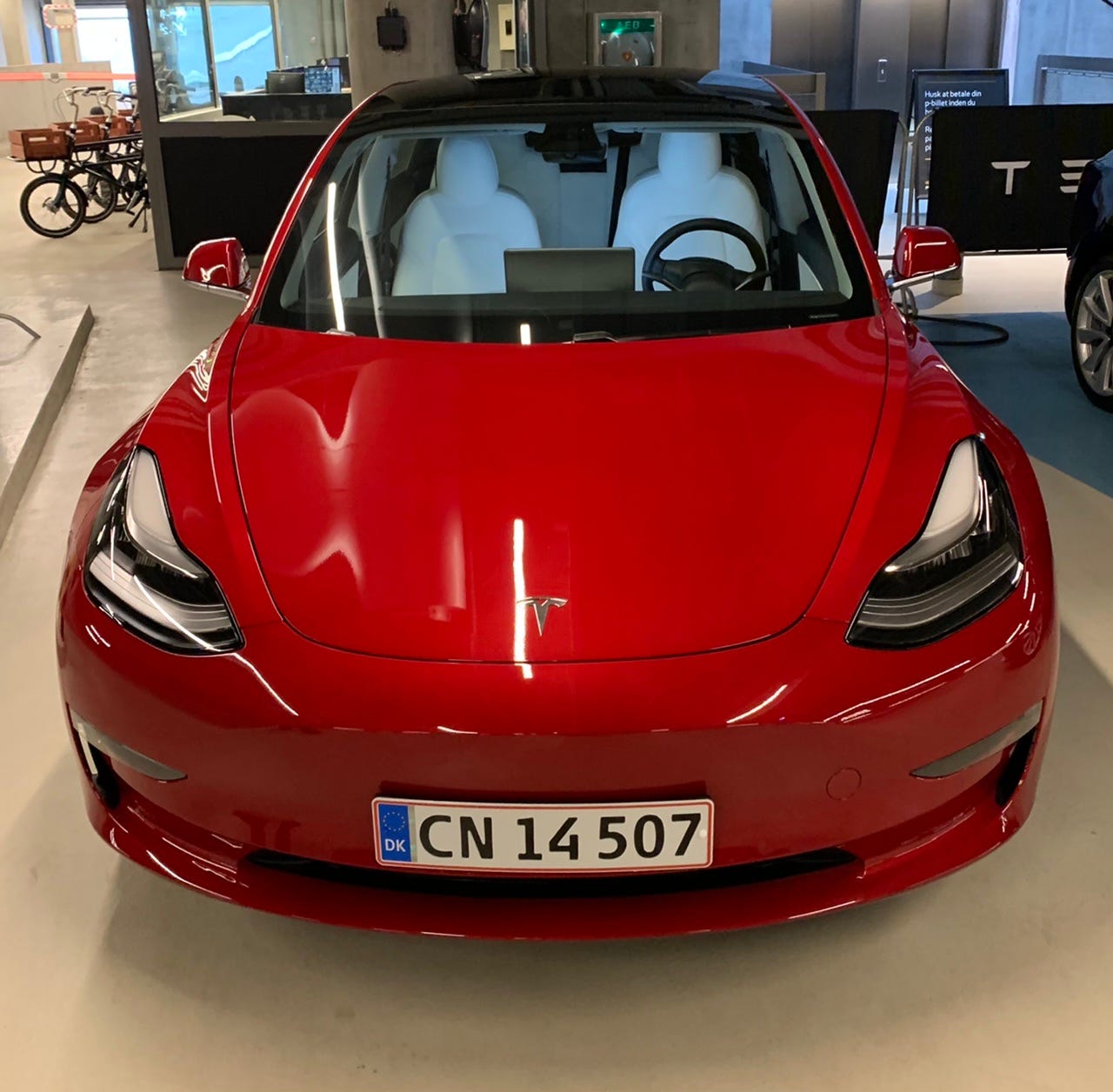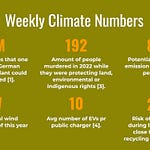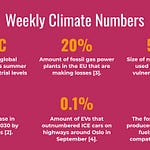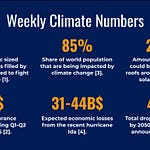Welcome to this weeks edition of The Weekly Climate! 🎉
Ok that went pretty poorly.
This week I took my own medicine based on the last newsletter which focussed on how bad gas stoves are for the climate and for the indoor climate. So I posted on our apartment buildings facebook page the facts about gas stoves and that I wanted to lead the effort in getting our gas stoves replaced. I wrote that if I could get people to say they were interested in that then I would also try to negotiate a good deal for the new induction stoves and the various parts of the process. People literally only needed to say yes and open their door for various installers. I would handle everything. We are ~24 units in my apartment building and I got a response from 3 people:
Over my dead body and an excuse that we shouldn’t do it because our electricity grid is not green enough 🙄
We already did it and we love it (I knew one unit already did it) 🤩
Yes please 🤗
I deeply and passionately want to understand why. The asthma argument alone should be more than enough. Who want to have 50/50 risk of getting asthma?
I live in the hipster part of Vesterbro in Copenhagen. Everyone in the building are white, privileged and have well-paying jobs. Why can’t people seem to understand such basic facts and act on them? I can understand if people can’t do it because of cost. That is 100% a fair reason I guess.
If we can’t figure out how to get well-educated and smart people to accept such obvious facts then how can we get e.g. a Trump voter to do it? Only the people can solve the climate crisis, we need everybody.
Did you try to convince anybody about gas stoves this week? If you have any insights and thoughts into this I really want to know. Any thoughts and comments are welcome. Please comment either below or by e-mailing me 🙏.
📰 In the news
Here are the most interesting and important news items from last week!
🇺🇸 Story we follow: U.S. Presidential Election
Ok let’s just agree that we continue with this until Biden is sworn in. Hopefully.
Solar companies asks Biden to rollback Trump’s biggest blow to the industry.
Activists camp outside Democrats headquarters to protest Biden’s fossil fuel industry hires.
Trump calls for bids to drill in the Arctic by mid-december in a race to get the permits out before Biden takes office. Even Norway is doing that 🙄.
Climate & Science
💨 We may have seen the last deadly storm this season which had a record-breaking 30 named storms. This happens as Iota wreaks havoc in South America.
💧 Greenlands largest glaciers near worst-case scenario melting rate
👩⚕️Prominent climate scientists debunk recent “point of no return” paper.
Technology
🚗 A large group of EV makers creates ZETA an organization with the purpose of ensuring 100% market penetration of EVs by 2030
🍭 EU targets 300GW of offshore wind by 2050. To put that into perspective the entire EU installed power capacity is roughly 1000GW. And we already have 180GW of installed wind. However, by 2050 much of that is likely at end-of-life. So what this means is that EU plan to power a little less (depending on the increase in power consumption) than 1/3 of all electricity by offshore wind.
☀️ Solar + Agriculture = Agrivoltaics which might become Africas next big solar market trend.
Investing
💵 325M$ EU fund to invest only in food, agriculture and oceantech startups.
⚔️ GM invests 27B$ to fight Tesla in North America.
💰Bezos announces first winners of 10B$ fund.
Major Carbon Emitters
👹 The ultimate Darth Vader of the fossil fuel industry, Charles Koch, wants to work with the Democrats and he has released a new book that by surprise touts an approach that activists has been trying to push for decades: Bottom-up. WTF to make of this? Koch was a wellknown donor to Trump and as the book Kochland describes in excruciating detail he has been a major peddler and supporter of fossil fuel propaganda.
🤕 Related: For 25K$ you can publish climate denial in the Washington Post.
✈️ 1% of people cause half of aviations emissions.
🐮Emissions from food production alone will put Paris targets out of reach. We need policies soon to help change to a plant-based diet.
🛢Middle East oil majors drowning in debt. Aramco just took out new loans to pay the largest dividends in the industry. Pee in your pants much?
Politics
🇫🇷 Top court ruling in France gives the government 3 months to act on climate change.
🇪🇺 Decarbonization of Eastern Europe’s energy mix is key to reaching climate goals.
🇬🇧 UKs Boris Johnson announces details of climate plan, which is being called a good start but missing crucial points such as nature-based solutions.
Climate Justice
👩🌾 Crop diversification is an important way to adapt to climate change and in farms in Bangladesh where women is in charge there’s more of that
🛢 Desperate for fuel people in Venezuela steals crude and make their own gasoline.
🔥 Bolsanaro’s attack on the Amazon breaches Brazil’s constitution, climate lawyers argue.
🙏 Funding for climate disasters are failing the most vulnerable.
🛢 California may be banning ICE cars by 2030, but it’s still legal to drill next door to an elementary school.
All we can save bookclub and other books
📕 Heated All we can save bookclub week 7 — and a detailed look at Bezos climate fund allocations.
Other
🛰 Sci-Fi author Kim Stanley Robinson with new book that shows how to solve the climate crisis.
🙉 Greentrolling: A maniacal plan to bring down big oil.
☠️ We finish with one of the most exciting news this week which is a new campaign by Fossil Free Media which aims to stop PR and ad agencies to stop working with fossil fuel companies. Bill McKibben wrote a great post about the importance of it. This is going to be really exciting to follow.
Key podcasts
Drilled — S5E8 Damages: Chevron's legal team shocks the Ecuadorian plaintiffs with a massive racketeering claim in the U.S. alleging fraud, witness tampering, and even bribery.
Energy Gang — Automakers knew about climate change 50 years ago: This week the gang dives into a news item I brought a few weeks ago, the fact that the automakers knew too.
How to save a planet — Trying to talk to family about climate change? Here’s how. Also a topic we covered in a recent newsletter. Some great tips in this one though!
A matter of degrees — Cleaning up the carbon mess: A look at carbon removal technologies, both natural and technical.
The Interchange — Decoding the New Energy Consumer: Decarbonizing the grid is the most important thing we must do to stand a chance at solving the climate crisis. How does the new energy consumer play into that?
💪One way to take action: Electric vehicles
The Problem: Opportunities to switch cars happens rarely when they do we need to take advantage of them
I know. The decision to buy a new car is not something that happens every day But when it does we need to make the right decision as buying a car locks in a large part of your family’s emissions for the next year. Perhaps you have friends, family or colleagues who right at this moment are considering to buy a new car. We need you to help them make the right decision to purchase an EV. Remember (see the action section of a recent newsletter) that we need to get every single purchasing decision right from now on and until we have solved the climate crisis. As an EV owner myself I run into many conversations with friends and family about how EVs are not better than internal combustion engine cars and I wanted to gather all the resources about why that is untrue in one newsletter for easy reference for anybody.
Solution(s): EVs are better in every way
Here’s a list of reasons why EVs are better.
P.S. I was a bit late with this newsletter so admittedly this is just off the top of my head.
No CO2 emissions while driving: Yay.
Lower total lifetime CO2 emissions: I’m not a researcher in this so instead I suggest to read this study or listen to this podcast. Please note that fossil fuel sponsored research studies keep on appearing which claim the opposite — even in major news media. Whenever you see a new study always check who sponsors it and I will guarantee you that any study that says otherwise is fossil fuel sponsored.
Cheaper, fewer repairs and service appointments: Fewer moveable components in electric motors means less service. No oil changes and other things are needed. In fact, the only maintenance you need to perform is to add sprinkler fluid once in a while and take it to the shop to switch between summer/winter tires. See this for a comparison.
All new EVs can go anywhere: A Renault Zoe, one of the cheapest new EVs, still goes 380 km on a full charge. However, you should bare in mind that you almost never use a full charge. You would probably usually use 70-80% of a full charge. That’s still 260-300km. Older used EVs might have shorter ranges.
Charging stations everywhere: You can charge the car everywhere. If you have a house you charge using a power outlet in your home. In many cases the setup comes for free when you sign up with a provider. If you’re in an apartment building you likely need to use public charging. Fortunately, in most major cities these are everywhere nowadays. In Copenhagen they’re everywhere. From top of my mind I have around 30-40 public chargers within 600m of my apartment.
Charging speeds are negligible: Fast charging is only relevant when you’re going on vacation. In your daily life with the car you’re just plugging it in when you get home and you never have to worry about charging again. For when you are on vacation fast chargers are popping up all over the place. Both eON, Clever and Ionity are deploying fast chargers everywhere. Of course if you have a Tesla you will have access to Tesla’s Supercharger network. All fastchargers are sufficiently fast and are usually available along major freeways when you have to drive far. On a fastcharger it takes around 20-40minutes to go from 0%-100% depending on how big the battery in your car is and the speed of the fastcharger. The major parameter to look for here is how fast charging speeds your car supports. For instance, a Renault Zoe only supports 50KW, where as fastchargers can go up to 150+ KW.
Silent: Yes you can probably hear road noise more now, but in your ICE car that noise is also there. It’s just drowned out by the loud noise of the engine.
One pedal driving: EVs have regenerative braking, which means that when the car slows down the energy is fed back into the battery. Hence in order to drive efficiently you don’t want to hit the brake pedal at all but rather let the slowdown caused by the regenerative breaking stop the car. This may seem like a small thing, but soon you can’t believe you ever needed a brake pedal (except, you know, in the emergency situations). And it’s going to be way more comfortable ride for your passengers as well.
No gas stations: You never have to set foot in a gas station ever again.
Fun: EVs have instant torque. As soon as you put your foot down it moves. No engine need to rev up. Just push and it goes.
When I try to convince family and friends about getting an EV the number one concerns I always hear is around charging:
It takes too long (see above).
It’s a hassle to plan charging stops.
What if you’re in the middle of nowhere with no chargers nearby?
Charging on long trips is annoying.
But also a few other things which we will wrap up with. First additional charging concerns:
It’s a hassle to plan charging stops. First of all 99% of the time you don’t even think about charging the car, because you just plug it in when you get home from work or similar. The only time you have to think about it is when you go on vacation. And even then it’s pretty easy. There are tons of apps and resources to use to make charging a no-brainer. The number one app you must get is A Better Route Planner (ABRP). Here you simply pick your car type, type your destination and the app calculates which stops you need to make. In the screenshot below, the destination chosen was Agde in Southern France. You can see that the charging only adds 3.5h to my 19h trip. And you can probably optimize that if you’re have no range anxiety at all.
I find this app to be very precise. It’s +-5% off most of the times due to weather, road conditions etc. If you really have a hard case of range anxiety or just have a heavy right foot you can manually enter the average power consumption for your car. If you know how to use Google Maps, you can figure out how to charge your car on vacation.
What about being in the middle of nowhere with no chargers nearby? For that, the solution is called Plugsurfing. You pay a one time fee and get a chip-card. Then you download their app and now you can see all the chargers you can use nearby. Which is typically quite a lot. When we were driving through Germany this summer we actually did end up a place where there were a big hole in Tesla Supercharger coverage. So I just used the app to find a 50KW charger at a hotel in the city we stayed in. And this was a very small German town in Harzen. Granted it’s more expensive charging with this, but you only use it when you have no other options. Worst worst worst case you will always carry a trickle charger in the car, which you can hook up to any power outlet. It will take you ~24h to charge from 0-100% but you would never charge that much with it. I’ve never used my trickle charger, but it’s good to know it’s there in the freak case you really do run out.
Charging on long trips is annoying. Is it really? When was the last time you enjoyed driving more than 3-4hours straight with no breaks? Our 2year old is certainly not a fan of that.
That was the charging concerns. Now a few extra:
Are you sure that they’re better for the climate? I’ve already provided the initial but for those that are really stubborn you can add that electric motors are way more efficient than an ICE. In an ICE a lot of the energy is wasted as heat. Suppose your ICE produces 1KW then maybe half of that is wasted. Whereas in an EV if your electric motor produces 1KW you get almost 1KW of power. This means that you get more driving distance per unit of pollution of your grid.
And the final one: Batteries are horrible! It’s important that we don’t ignore child labor and other horrors that are happening in some of these mines. This need to be stopped at all costs. However, I gotta say that the easy argument to this one is that fossil fuels are worse when it comes to ethics. They use child labor too. They kill people. They pollute. They destroy vast swaths of nature. And they threaten the future of humanity’s entire existence. (For more information about these claims see Drilled or previous newsletters).
If you have an EV please add your additional tips, pros and cons in the comments below!
One action: Hear something say something
If you hear somebody talking about getting a new car talk to them about the points above or just send them this newsletter. If you’re considering yourself to buy a new car then what’s holding you back from making the decision to get an EV?
That’s it for this week folks! If you feel like I’m missing something, please let me know.
If you enjoyed this newsletter don’t forget to share it with your friends, coworkers or other people you think could benefit from getting it. If you got directed here by a friend or another link on the Internet don’t forget to subscribe!
See you all next week 👋













